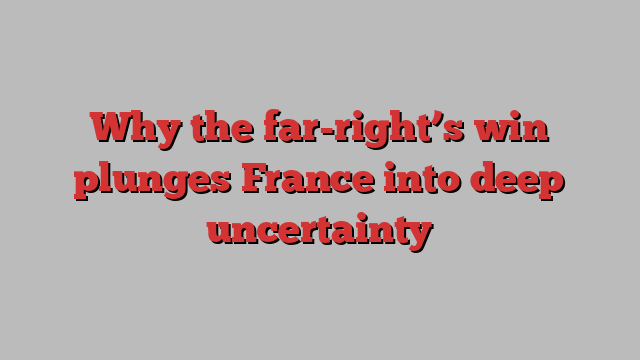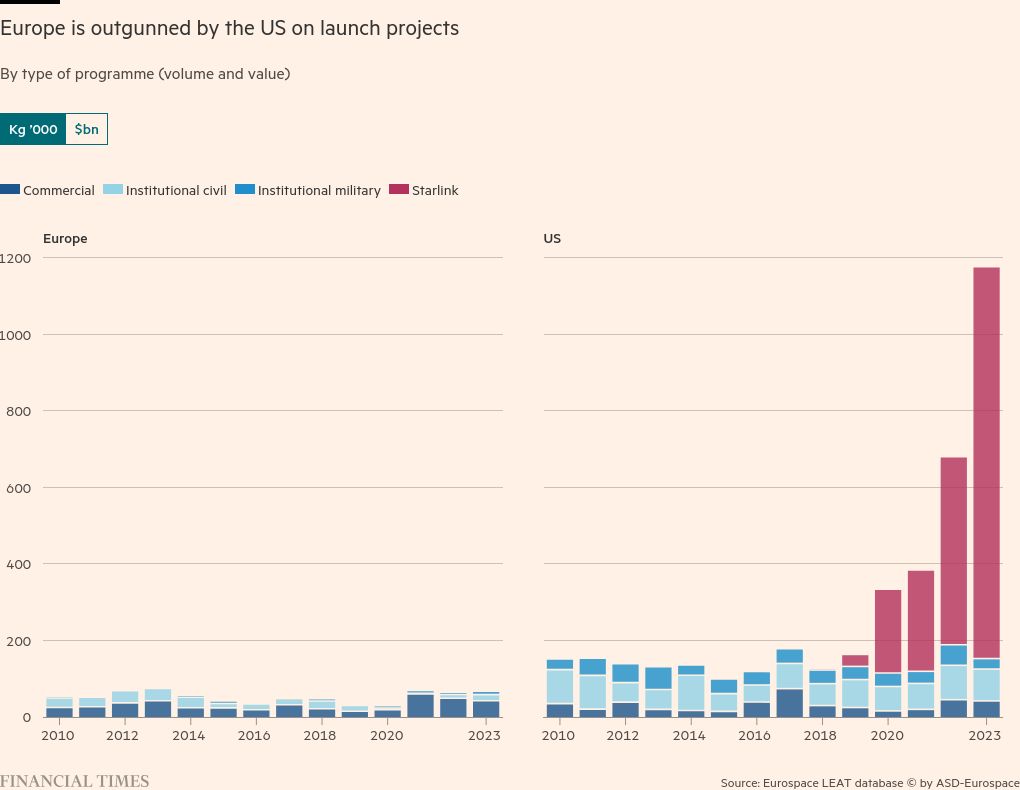
This article is an onsite version of our Europe Express newsletter. Premium subscribers can sign up here to get the newsletter delivered every weekday and Saturday morning. Standard subscribers can upgrade to Premium here, or explore all FT newsletters
Good morning. French President Emmanuel Macron called a snap election aiming to check the rising popularity of the far right. What he achieved was handing them a storming victory.
Today, our election watcher explains the key outcomes of yesterday’s first-round vote. And the head of the European socialists tells our parliament correspondent she wants Ursula von der Leyen to trust in a centrist coalition that isolates Italian premier Giorgia Meloni.
The gamble that backfired
Yesterday’s first round of French parliamentary elections confirmed what many allies of President Emmanuel Macron feared: the far right is advancing on its seemingly inexorable rise to power, writes Akila Quinio.
Marine Le Pen’s Rassemblement National (RN) won a projected 34 per cent of votes, ahead of the leftwing coalition Nouveau Front Populaire (NFP), which bagged 28.5 per cent of votes. Macron’s centrist Ensemble alliance salvaged 22.5 per cent.
Context: The far-right’s momentum, which mimics a wider European trend, is not losing steam in France. Whether the party is on course to govern in a power-sharing cohabitation with Macron, or fall short of an outright majority in the second round next Sunday remains the big question.
Pollster Ipsos estimates that RN could secure between 230 and 280 parliamentary seats, falling short of an outright majority, but challenging Macron with a hung parliament. The president can’t call an election for another year (and has so far insisted he will not resign).
But Ipsos’ projection does not account for the messy workings of France’s two-round voting system, including candidates stepping down in an effort to harm the far right or the far left’s chances.
All eyes are on the hundreds of constituencies where three candidates have qualified for a run-off. Manoeuvring has already begun to determine who will step down to bolster other candidates’ chances against rival blocs.
Given that it only took a few days for unexpected alliances and spectacular fractures to form across the political spectrum after Macron called the snap election, similarly fast shifts may happen in the next days.
The Republican tradition of mainstream parties calling for a front against the far right at all costs has already been shredded. The conservative Les Républicains said that it would let its voters decide who to back in run-offs, in effect refusing to urge them to stop the far right.
The leftwing NFP said its candidates would step down in three-way run-offs where they have come last. Macron’s Ensemble bloc said its candidates would step down in favour of contenders “in a position to beat the RN and with whom we share the essential: the values of the Republic”, without saying whether this includes the far left LFI.
“Our objective is clear: stopping the RN from having an absolute majority in the second round and governing the country with its disastrous project,” said Prime Minister Gabriel Attal.
Chart du jour: Space race

Next week should see the first new European rocket launch in almost 30 years. Ariane 6’s maiden flight will test the EU’s space ambitions and could boost the continent’s credibility in the global commercial rocket launch market.
Holding the centre
Ursula von der Leyen must isolate Italian premier Giorgia Meloni and rely on pro-European parties to win the votes for a second term, the leader of the Socialist group in the European parliament tells Andy Bounds.
Context: Meloni abstained at a summit on Thursday where EU leaders proposed von der Leyen for a second term as European Commission president. But Meloni’s 24 MEPs could be vital to get the 361 votes the German needs to get approved by parliament in mid-July.
Iratxe García Perez, leader of the Socialists and Democrats, said von der Leyen’s centre-right European People’s party must stick with the coalition featuring her group and the liberal Renew, and if necessary the Greens.
The three groups have 399 votes, though they could still expand before a July 4 deadline. The Greens have more than 50 seats.
“Ursula von der Leyen can build a majority with pro-European political forces,” García said.
An overt deal with Meloni’s hard-right group would cost von der Leyen Socialist votes. “We will never agree to an alliance with those who want to destroy the EU,” said García. She also cautioned against offering a plum commission job to buy Italian votes. “Giving a vice-president to Meloni would not help the negotiations,” she said.
The Socialists, who won 136 seats, have their own demands, but they will not be finalised until this week. They include support for people to cut their carbon emissions, committing to the EU net zero emission goal, strengthened social policy and a tough line on rule of law breaches.
“We are ready to defend European values, democracy and freedom,” García said.
What to watch today
-
Hungarian presidency of the Council of the EU begins.
-
German Chancellor Olaf Scholz meets Poland’s Prime Minister Donald Tusk in Warsaw.
Now read these
Recommended newsletters for you
The State of Britain — Helping you navigate the twists and turns of Britain’s post-Brexit relationship with Europe and beyond. Sign up here
Chris Giles on Central Banks — Your essential guide to money, interest rates, inflation and what central banks are thinking. Sign up here
Are you enjoying Europe Express? Sign up here to have it delivered straight to your inbox every workday at 7am CET and on Saturdays at noon CET. Do tell us what you think, we love to hear from you: [email protected]. Keep up with the latest European stories @FT Europe